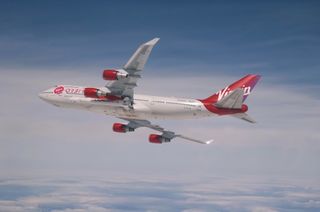Sensor glitch delays Virgin Orbit's 1st launch of new LauncherOne rocket
The next launch window opens on Monday, May 25.

Update for Monday, May 25: Virgin Orbit is now targeting its first LauncherOne launch for May 25 between 10 a.m. and 2 p.m. PDT (1-5 p.m. EDT/1700-2100 GMT). Our original delay story is below.
Virgin Orbit postponed the launch debut of its new rocket for small satellite missions today (May 24) due to a sensor glitch on the booster.
The rocket, an air-launched vehicle called LauncherOne, was expected to make its first test flight over the Pacific Ocean during a four-hour window that opened at 10 a.m. PDT (1 p.m. EDT/1700 GMT). But after fueling the rocket late Saturday, an issue popped up.
"Everything has been proceeding smoothly: team, aircraft, & rocket are in excellent shape. However, we have one sensor that is acting up," Virgin Orbit wrote in a Twitter update. "Out of an abundance of caution, we are offloading fuel to address."
In photos: Virgin Orbit's LauncherOne rocket for satellite missions
Virgin Orbit may try again on Monday (May 25), its backup date for LauncherOne's debut.
"Currently, it appears we've got a straightforward path to address this minor sensor issue and recycle quickly," the company wrote. "The crew are already hard at work putting that plan into action."
Get the Space.com Newsletter
Breaking space news, the latest updates on rocket launches, skywatching events and more!
LauncherOne is a small-satellite booster designed to loft payloads of up to 1,100 lbs. (500 kilograms) to low Earth orbit. The liquid-fueled rocket is about 70 feet long (21 meters) and uses the rocket-grade kerosene RP-1 and liquid oxygen as propellant.
Virgin Orbit plans to launch LauncherOne from the air using a carrier plane called Cosmic Girl, a Boeing 747 jumbo jet modified for rocket missions. Under the plan, the carrier plane will take off from the Mojave Air and Space Port in Mojave, California, fly over the Pacific Ocean and drop LauncherOne from an altitude of 35,000 feet (10,700 m).
For this test flight, LauncherOne is carrying a dummy payload that will be sent into a low orbit to ensure it falls back to Earth quickly and burns up in the atmosphere, Virgin Orbit Vice President Will Pomerantz told reporters in a press conference Saturday.
"It is essentially a nice-looking inert mass that allows us to practice with it," Pomerantz said.
Virgin Orbit CEO Dan Hart stressed that LauncherOne is a brand-new vehicle in Saturday's press conference, adding that it likely would not launch on the first try.
"There is certainly a significant likelihood that we don't get to countdown on our first pass," Hart said. "This is a test flight. The purpose of this flight is to incrementally test the rocket and the airplane."
Virgin Orbit was founded in 2012 by British billionaire Sir Richard Branson and aims to launch missions for customers at $12 million per flight. The company has since secured a three-launch deal worth $35 million to launch missions for the United States Space Force.
Branson also has another space company, Virgin Galactic, which aims to fly passengers on a suborbital space plane called SpaceShipTwo. Tickets for those flights cost $250,000 per seat.
- Virgin Orbit's rocket-launching plane keeps taking test flights with LauncherOne
- Virgin Orbit could launch Polish cubesat mission to Mars in 2022
- Virgin Galactic gearing up to start selling suborbital spaceflight tickets again
Email Tariq Malik at tmalik@space.com or follow him @tariqjmalik. Follow us @Spacedotcom, Facebook and Instagram.
OFFER: Save 45% on 'All About Space' 'How it Works' and 'All About History'!
For a limited time, you can take out a digital subscription to any of our best-selling science magazines for just $2.38 per month, or 45% off the standard price for the first three months.
Join our Space Forums to keep talking space on the latest missions, night sky and more! And if you have a news tip, correction or comment, let us know at: community@space.com.

Tariq is the Editor-in-Chief of Space.com and joined the team in 2001, first as an intern and staff writer, and later as an editor. He covers human spaceflight, exploration and space science, as well as skywatching and entertainment. He became Space.com's Managing Editor in 2009 and Editor-in-Chief in 2019. Before joining Space.com, Tariq was a staff reporter for The Los Angeles Times covering education and city beats in La Habra, Fullerton and Huntington Beach. In October 2022, Tariq received the Harry Kolcum Award for excellence in space reporting from the National Space Club Florida Committee. He is also an Eagle Scout (yes, he has the Space Exploration merit badge) and went to Space Camp four times as a kid and a fifth time as an adult. He has journalism degrees from the University of Southern California and New York University. You can find Tariq at Space.com and as the co-host to the This Week In Space podcast with space historian Rod Pyle on the TWiT network. To see his latest project, you can follow Tariq on Twitter @tariqjmalik.

